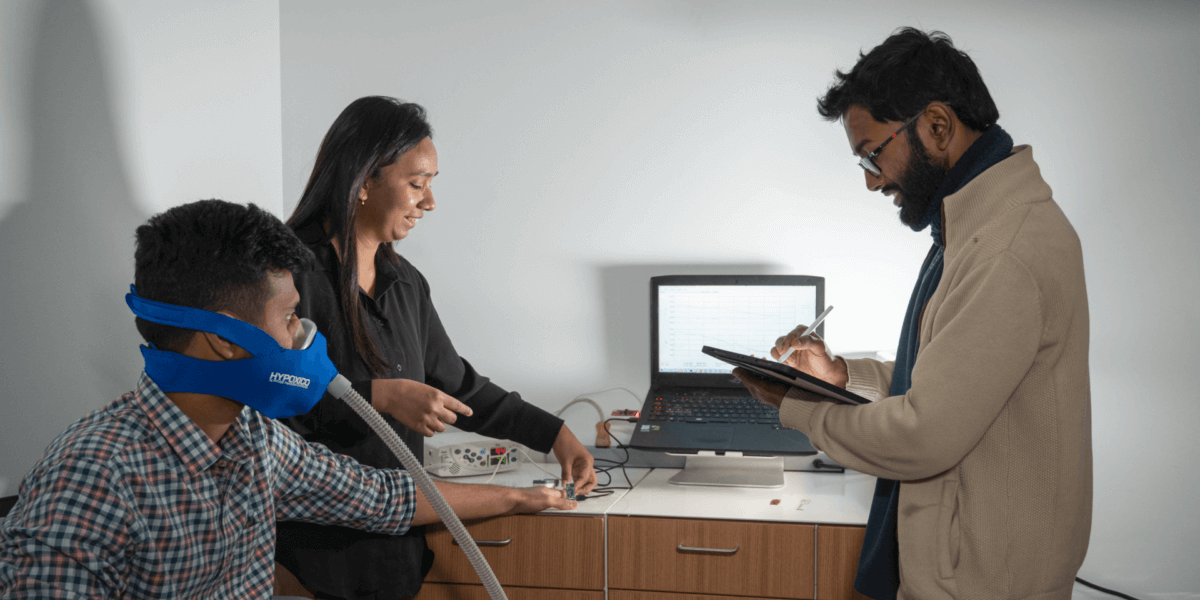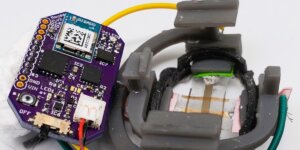
Surya Kasiviswanathan, Munia Ferdoushi, and Md Farhad Hassan are testing the new oximeter at USC. (PHOTO/COURTESY OF YASSER KHAN)
What happens when a medical device used by billions worldwide turns out to have a critical bias against people of color? When the oximeter was revealed to mismeasure oxygen levels in darker skin tones, Yasser Khan undertook the challenge of coming up with a solution.
Khan, an assistant professor of electrical and computer engineering at the USC Viterbi School of Engineering, recently received a prestigious 2023 Google Research Scholar Award for his proposal of racial bias correction in oximetry using Google’s skin tone framework. The award supports early-career professors and provides funding, as well as mentoring and collaboration opportunities with the Google team.
Khan’s work promises to develop a solution to the oximeter so that it can detect differing skin tones and reduce bias in oxygen measurements. He hopes to help bring accountability and equity to a ubiquitous and essential medical device so that people of all skin tones can receive adequate treatment based on accurate, unbiased measurements.
“I’m excited for the support from Google, and even more excited to get to interact with the Google engineers. They are passionate about finding solutions to pressing problems. Racial bias is one of the biggest problems in medical devices.” said Khan, who joined the Ming Hsieh Department of Electrical and Computer Engineering in 2022.
“The error due to skin color has been overlooked for almost 50 years,” he added. “We now have an opportunity to address a major problem in the most ubiquitous medical device in the world. This project will significantly impact people’s lives, which is super exciting and rewarding.”
The oximeter is a medical device that measures oxygen saturation in the blood. It works via an optical device that shines light onto a patch of skin on the finger—different colors of light interact with the plot of skin to measure how much oxygen is in the blood. Since oximeters are light-based devices, the light source and detector are bound to be affected by skin pigmentation.
However, people have underestimated the extent to which skin pigmentation could affect the oximeter’s accuracy. When COVID-19 affected the lungs and more people used oximeters than ever before, a study at the University of Michigan found that oximeters’ error rate for darker skin tones was three times higher than for lighter skin tones.
According to The BMJ, a British medical journal, occult hypoxia — when arterial blood oxygen saturation is below 88% despite the pulse oximeter reading greater than 92% — was significantly higher in black patients than for white patients. This inaccuracy meant that caregivers failed to administer the proper oxygen therapies to patients needing supplemental oxygen because the optical device could not properly take darker skin tones into account.
When a journalist from Chemical & Engineering News reached out in December 2020 to ask Khan for his insight on pulse oximeters, he realized he wanted to further explore the issue and try to come up with a solution himself.
With a background in flexible electronics, his UC Berkeley Ph.D. research involved developing an oximeter with a sensor similar to the skin, so the device could be worn more comfortably by patients. In 2014, Khan developed the first flexible organic oximeter in the world, and in 2018, he demonstrated array-oximetry, where multiple patches could take a map of oxygenation throughout the body.
“This training actually helped me to understand the detailed inner workings of oximeters,” Khan said.
With his experience with oximeters and wearable, implantable, and ingestible medical devices, Khan believed he had to undertake the challenge of racial bias in oximetry. Khan’s proposed solution that won him a Google Research Scholar award calls for designing a new oximeter device that works with an updated hardware and software system that can detect differences in skin tones.
“In the current oximeter design, it’s impossible to quantify the effects of skin color and the associated errors,” Khan said. “Our new hardware can identify skin color. With the additional sensing capability, we can correct the error from melanin.”
To develop his solution, Khan is working with collaborators at Google as well as dermatologists from the Keck School of Medicine of USC, who are helping him establish a research framework.
“In that way, USC is very helpful—it is full of people who are passionate and interested in getting involved in this sort of work,” Khan said.
in January 2022, Khan opened his lab at USC, where he focuses on flexible and printed electronics to make wearable, implantable and ingestible medical devices. He said the environment is extremely supportive and welcoming to young researchers, with opportunities for guidance and advising from peers and mentors.
Khan’s lab is also very welcoming to undergraduate researchers. Last year, 11 of them worked in Khan’s lab to gain knowledge and experience about developing medical devices.
“During my undergrad years, I didn’t even know about research until I started attending seminars and speaking to my professors. My career goals and passions changed drastically with experience and exposure, which helped me ultimately decide that I wanted to be a researcher,” Khan said. “So, one of my goals is to expose the younger minds to science and engineering: once they see it, they will fall in love with engineering.”
With the Google Research Scholar Program, Khan hopes to bring equity in medical devices all over the world.
“Medical devices should be scalable and easily accessible to everyone,” he said. “We haven’t explored other biases in many ubiquitous medical devices. This is the time to dig deep and address other unforeseen biases.”
Published on July 12th, 2023
Last updated on August 7th, 2023











